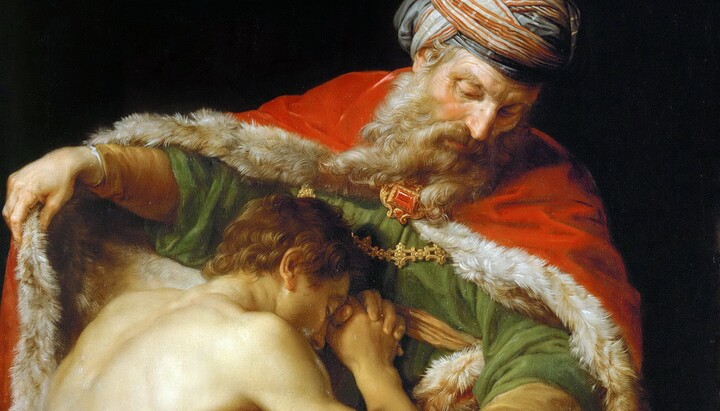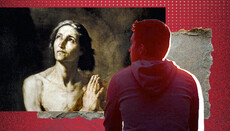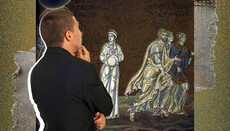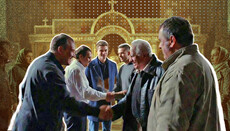Parable of the Merciful Father

Sunday Sermon.
All that gives hope, enchants with beauty, and inspires in the parable of the Prodigal Son is not the son who left for a far country, but the Father himself. Therefore, it would be more fitting to call this the Parable of the Merciful Father.
“God is Love,” teaches us the Holy Scripture. For a person who has forgotten love and cannot love, it is much easier to imagine God as the Supreme Judge, an implacable prosecutor who will meticulously examine each of our criminal cases at the Last Judgment.
Legalistic theology instills in us a primal fear of this universal tribunal, especially since we all understand that we have no defense.
We are truly terrified because we see ourselves as weak and surrounded by the sores of sin. No matter how hard we try to rid ourselves of them, we fail. We despair, fear, lose heart, and our hearts never find peace in times of sorrow. Yet one thing brings joy: there are people who have come to know God not from theological textbooks but through personal experience. They have established a personal relationship with Him and say that God is nothing like how we often imagine Him.
St. Silouan the Athonite comforts us: “Oh, if only the whole world knew the Lord and how God loves us, and how sweet His love is…” Western scholastics lost this love in legal formulas of redemption, becoming entangled in the letter of the Scriptures. But the holy fathers experienced God through the grace they received from Him. “How the Lord loves us, gently and without reproach, accepting us. Sweet is the soul’s time with the Lord. The soul melts away before the face of His love” (St. Silouan the Athonite).
In the earthly world, various feelings and emotions are named love. Yet among them, there is one closest to Divine love: a mother’s love for her child. Even if her son grows up to be wayward, even if he becomes wicked and unrighteous, she will continue to love and pity him. She may have often told him how to live rightly, advised, and admonished him, but he did not listen.
A mother cannot change anything; her son has made his choice. Yet she will wait and hope that he changes, comes to his senses, repents, and returns home to live in peace. Surely, this is how God waits for each of us.
“When the soul knows God’s love through the Holy Spirit, it clearly feels that the Lord is our Father – the dearest, closest, most beloved, and best of all” (St. Silouan the Athonite).
We wound our souls with sin, sowing evil and hatred in the world, living in the haze of passions, forgetting that God waits for us just as the Father waited for the Prodigal Son. He still loves us; otherwise, why would He have endured so much for our sake? God became man, endured torture, suffering, died, and descended into the darkest depths of hell to save every soul. Before we were even born, Christ bore the torments for the sins we would eventually commit. And still, He continues to suffer for us. Every evil deed we commit is another drop of His blood, another blow, another groan. All of this – for me alone.
“When a person gives their heart to God, their mind is also enveloped in God’s love, and their heart trembles with joy. And when God’s love overflows the heart, its sound can be felt by those around, for even the body partakes in this state…” (St. Paisios of Mount Athos).
The far country to which the Prodigal Son departed is the world we live in. The Prodigal Son himself is our mind, wandering through this world, seeking food for swine – digging through the filth for sensory pleasures. The Father’s house, where our Heavenly Father awaits us, is our heart. Our mind must return to it, find its way back.
To do this, the mind must detach from this world, despise it, and retreat into the silence of the inner man. There, lighting the lamp of unceasing prayer, it must seek the path to the Father’s house in the heart.
The essence of life in the “far country” is vanity and constant worry. Viewed from afar, this world is like a swarm of buzzing flies – restless souls trapped in a dream world. They believe that if they stop rummaging through the dung, they will perish. The fear of death fuels their frantic flurry and drives them into an endless, meaningless race.
This world of mad souls lies in a dark valley of forgetfulness of Truth, surrounded by towering mountain ridges.
If one ascends to the peaks of these mountains and looks down, one can see a narrow, steep, and perilous road leading to a completely different world – the world where the loving Father awaits the Prodigal Son. Those attempting to return along this path are accompanied by a thin ray of light that, piercing the murk of the dream world, enters the very heart of the traveler, enlightening and sanctifying their soul.
The first step on this journey is to renounce vanity and the hoarding of decaying earthly possessions, useless knowledge, and fleeting impressions. To be rich toward God means nothing less than becoming part of His life, to the point of complete likeness to Him. Accumulating riches for oneself means only one thing – gathering decay and death within. The only treasure worth discovering within oneself is a heart filled with God.
A life opposed to vanity is the fullness of serene, prayerful peace, revealing the wondrous truth that God is everywhere – around us, but most of all, within us. Entering the depths of one’s spirit, a person finds there the Spirit of God and, in Him, the fullness of life. Embraced by the heavenly arms of the Father, they behold the perfect purity of the formless Light, revealed as the humble love of the all-loving God. In this peace, nothing remains outside, and nothing lies beyond its comprehension.
Thus, Divine wisdom is revealed to silent souls and hearts that have ceased to live by their own thoughts and have renounced their desires.
While people in the valley of nightmarish dreams strive to reach the ultimate goal of their hatred – revenge – and adorn themselves with filth, hoarding it in their chests, a feast is taking place in the Heavenly Father’s house in honor of the returning son. The loving Father reveals Himself in Spirit and Truth to His children, who have found great peace in Him. These are the sons and daughters who began their journey to the Father’s house with great faith, growing into God with the edge of their hearts. They then directed all their strength to knowing Him, giving Him half of their hearts. Finally, having transformed their souls through prayer and contemplation, they offered their whole hearts as a heavenly gift to the Father, uniting with Him in the Holy Spirit and immersing themselves in the hidden life in Christ.
On this path, the devil set traps for them, trying to ensnare them with worldly cares; they had to avoid the quicksands of daily trivialities; countless dangers lay in wait for them until they reached their final destination.
This is the Orthodox path to salvation. There is no place here for hypocrisy, acting, or deceit. The Orthodox Church teaches us not to imitate holiness, but to acquire it.
Orthodoxy is not an escape from sorrows, but an ascent into boundless love for God and people.
Every neighbor is ourselves – it cannot be otherwise. The world of nightmarish dreams has now entered every home through the internet, television, and mass media. It seeps into our ears and eyes, doing everything to make each of us a part of this world. The devil is cunning and clever. We can never calculate where or how it will be easiest for us to find salvation. There is no place on earth beyond the reach of his satanic tentacles. The only place we can try to hide from him is within ourselves.
Retreating into ourselves, shielding ourselves from external madness with the walls of our hearts, is the only reliable path to salvation in the time of darkness. There, in the silence within, we will meet Christ, against whom the devil is powerless. Instead of stockpiling food for the “end times,” it is better to quietly store up grace in our hearts, for without it, even a decade’s supply of provisions will not help us.
Attending church services regularly should not end with being satisfied by sweet-voiced singing and loud readings. Public worship is meant only to awaken our appetite for salvation. The most satisfying feast is the formless individual prayer and contemplation in complete silence and solitude. The place where our senses and desires find rest is the place of solitude. In a pure heart, all passions and thoughts become still. In our spirit, we find salvation through the acquisition of the grace of the imperishable light. When this happens, our whole body becomes pure because the eye of our mind is pure. After this, the joy of contemplation will never leave our souls, for they will be established in the Holy Spirit.
When a person personally experiences the spiritual transformation of their consciousness, becoming one with the Holy Trinity, it means they have returned to the Father’s house and received rebirth from above.
The holy fathers teach us how to practically achieve the stillness of the mind to awaken our spirit. Without practicing spiritual life, the soul undergoes complete decay, and the heart becomes dead. The Church teaches us to be “ourselves,” meaning to remain silent with God in our own spirit instead of endlessly conversing with demonic temptations and thoughts.
The sign that the soul has reached its goal is an unceasing state of peace and calm in the heart, flowing into a steady and whole peace of the spirit. In this great tranquility, the human spirit unites with the grace of Christ, bringing it into the peace of God that surpasses all understanding. But before this happens, purity of thought must be achieved. After that comes the stillness of the mind, filled with the presence of Christ’s light.
To receive the precious ring placed on the prodigal son’s finger by the Heavenly Father, one must attain peace of heart. Only then can we acquire the peace of God, in which the boundless love of God for His creation is clearly revealed.











